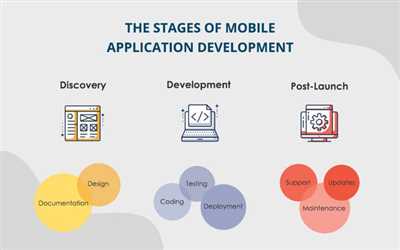
In today’s competitive market, app development has become a crucial part of any business. Whether you’re a web developer looking to expand into the mobile app market or you have your own unique idea for an application, knowing how to develop an app is essential.
There are many options available when it comes to app development, but there are a few key steps to get started. One of the best ways to begin is by exploring app development platforms that let you build apps without coding. BuildFire, for example, is a platform that allows you to develop mobile apps with minimal effort. It provides a user-friendly interface and a range of customizable templates, making it easier for you to bring your ideas to life.
Before diving into app development, it’s important to do some research and learning. Figure out what your target audience is, what features they would like to see in an app and what other similar apps are already available in the market. This will help you determine the unique selling points of your app and ensure that it stands out from the competition.
Once you have a clear idea of what you want to create, it’s time to start working on the actual development process. If you have a background in coding, you can choose to develop the app yourself. However, if coding isn’t your strong suit or if you want to save time and effort, you may consider using app builders or hiring a developer to bring your vision to life.
When developing an app, it’s important to be detail-oriented and consider all aspects of the user experience. This includes the design, functionality, and overall flow of the application. You want to make sure that your app is intuitive and user-friendly, as this will greatly impact its success and reception by customers.
Once your app is developed, it’s time to market it and get it in front of your target audience. This involves various strategies such as app store optimization, social media marketing, and reaching out to potential clients or customers. The more effort and resources you put into marketing your app, the more successful it is likely to be.
Starting an app development career or creating a successful app for your own business takes time, research, and dedication. However, with the right tools, knowledge, and passion for creating innovative solutions, you can turn your idea into a reality and make an impact in the mobile app market.
- How to Start an App – 8 Steps You Must Take Before Starting Mobile App Development
- Why Get Involved in Mobile App Development
- 2 Detail-oriented Market research
- Option 2: Use app builders
- Common Questions About Learning App Development
- How do I start learning to develop apps
- Can I learn app development on my own
- How long does it take to learn app development
- Is it easier to make a web app or mobile app
- Videos:
- Android App Development Tutorial for Beginners – Your First App
How to Start an App – 8 Steps You Must Take Before Starting Mobile App Development
Before you dive into mobile app development, it’s important to take several crucial steps to ensure a successful and efficient process. By following these steps, you can save time, resources, and money, and ultimately create a mobile app that meets your business goals and delights your customers. Here are the 8 steps you must take before starting mobile app development:
1. Define your app’s purpose and target audience.
Before you start developing your app, you need to have a clear understanding of what it’s going to do and who it’s going to serve. Define the main purpose of your app and identify your target audience. This will help you make informed decisions during the development process and ensure that your app meets the needs of your customers.
2. Conduct market research.
To create a successful app, you need to have a good understanding of the market and your competitors. Research existing apps that are similar to yours and analyze their strengths and weaknesses. This will help you identify opportunities for differentiation and ensure that your app stands out in a competitive market.
3. Develop a detailed app concept.
Once you have a clear understanding of your app’s purpose, target audience, and the competitive landscape, it’s time to develop a detailed app concept. This includes defining the features and functionality of your app, creating wireframes and prototypes, and outlining the user experience. A detailed app concept will serve as a roadmap for the development process and help you communicate your vision to developers.
4. Decide on the development approach.
There are several options for mobile app development, including building the app from scratch using custom code, using a mobile app development platform or template, or hiring a third-party developer. Consider the pros and cons of each approach and choose the one that best fits your budget, timeline, and technical capabilities.
5. Find the right development team.
If you decide to work with developers, it’s important to find the right team who can bring your app concept to life. Look for developers who have experience working on similar projects and who are detail-oriented and reliable. Spend time reviewing their portfolios and consider reaching out to their past clients to learn about their experiences.
6. Learn the basics of app development.
Even if you’re not a developer yourself, it’s important to have a basic understanding of app development. This will help you communicate effectively with your development team and make informed decisions during the development process. Take the time to learn about the different programming languages, frameworks, and tools involved in mobile app development.
7. Create a development timeline.
Developing a mobile app can take a long time and a lot of effort, so it’s important to create a realistic development timeline. Break down the development process into smaller tasks and set deadlines for each task. This will help you stay organized and ensure that the development process stays on track.
8. Test and iterate.
Once your app is developed, it’s important to test it thoroughly to ensure that it works properly and meets the needs of your target audience. Gather feedback from your beta testers and make any necessary improvements or changes. Keep in mind that app development is an ongoing process, and you may need to iterate and improve your app over time.
By following these 8 steps before starting mobile app development, you can increase your chances of creating a successful and unique mobile app that meets the needs of your customers and stands out in a competitive market.
Why Get Involved in Mobile App Development

Mobile app development is one of the most popular and lucrative fields in the tech industry today. If you have the right skills and background, it can be a great option for starting a successful career or adding a new dimension to your existing business.
There are several reasons why getting involved in mobile app development is a smart move. Firstly, the mobile market is booming, with more and more businesses and individuals relying on mobile apps to reach their audience. By developing mobile apps, you can tap into this market and help clients and businesses explore new opportunities.
Mobile apps are also in high demand because they offer a more direct and personalized way for businesses to engage with their customers. Unlike a website or generic template, a mobile app lets businesses create a unique and tailored experience for their users. This can help build customer loyalty and generate repeat business.
In addition, mobile app development is a great way to make money. Many developers charge clients for their services, allowing them to earn a living doing something they love. There are also various ways to monetize your own apps, such as through in-app purchases or advertising.
To get involved in mobile app development, you must have a detail-oriented mindset and a knack for problem-solving. Developing an app takes time, effort, and technical skill. You will need to learn the necessary programming languages and familiarize yourself with the tools and frameworks used in app development. There are many online resources and courses available to help you learn, so take the time to do your research and explore what best fits your budget and learning style.
When starting out, it’s best to begin with a small project and gradually work your way up. This way, you can gain experience and learn from your mistakes without being overwhelmed by the complexity of larger projects. It’s also important to ask questions and seek guidance from more experienced developers, as this will help you grow and improve your skills.
Mobile app development can be a rewarding and fulfilling career choice for those who are passionate about technology and creating innovative solutions. By getting involved in this field, you have the opportunity to directly impact the lives of millions of people, as well as contribute to the ever-evolving mobile industry.
2 Detail-oriented Market research
Before starting the development process, it is crucial to conduct thorough market research. This step is essential for any successful app development project, as it allows you to gather valuable information about your target audience and competitors. Being detail-oriented when performing market research can significantly increase your chances of creating a unique and successful application.
Market research involves working directly with potential users and clients to learn about their needs, preferences, and expectations. By understanding what your target audience wants and needs, you can tailor your app to meet their specific requirements. This step also helps you identify your competitors and gain insights into their strengths and weaknesses.
When conducting market research, it’s important to consider various elements such as your budget, timeline, and the complexity of the app you want to develop. There are many tools and resources available online that can help you gather the necessary data. For example, you can use template surveys or conduct interviews to gather feedback from your potential users.
One option is to use third-party platforms like BuildFire, which offers a wide range of features and tools to support your app development journey. These platforms can help you create a unique and user-friendly app without the need for deep technical knowledge or coding background.
By conducting diligent market research, you can also figure out how to monetize your app. Understanding the revenue streams available in your industry can help you make informed decisions about pricing models or advertising opportunities that align with your target audience’s preferences and your business goals.
Market research not only helps you gather important data but also provides insights into the market trends and demands. This knowledge can be beneficial not only for developing and designing your app but also for your long-term business strategy. It allows you to better understand your audience, stay competitive, and make data-driven decisions.
In conclusion, starting app development with detail-oriented market research is a crucial step to ensure the success of your mobile application. By investing time and effort into understanding your target audience, competitors, and market trends, you can make informed decisions and create a unique and user-friendly app that meets the needs and desires of your users. Market research is an essential part of the app development process and can significantly impact the overall success of your app and your business.
Option 2: Use app builders
If you’re not familiar with coding or don’t have the time to figure out how to develop your own app from scratch, using app builders can be a great option. App builders are tools that allow you to create a mobile application without having to write any code.
There are many app builders out there, each with their own unique features and pricing models. Some app builders are free, while others require a monthly subscription or a one-time fee. When choosing an app builder, it’s important to consider your budget and the specific needs of your business or idea.
One popular option is BuildFire, an app builder that lets you create a mobile application by simply dragging and dropping pre-built templates and features. It’s a great option for businesses or individuals who want to quickly get their app up and running without spending a lot of money or time.
Using an app builder is a step-by-step process. First, you need to research and explore the various app builders available to you. Look at their features, pricing, and user reviews to determine which one is best for your needs.
Once you’ve chosen an app builder, you’ll need to sign up and create an account. From there, you can start designing your app using the app builder’s interface. Most app builders provide a range of customization options, allowing you to tailor your app to your brand and target audience.
During the design process, it’s important to keep your audience and their needs in mind. A successful app is one that solves a problem or provides value to its users. Consider what features and functionality your app should have to best serve your customers.
After you’ve finished designing your app, you can then publish it to the app stores or directly to your target market. App builders often have integrations with popular app stores, making it easy to make your app available to your users.
Using app builders can be a great way to get started with app development if you don’t have experience in coding or a large budget. They provide a more hands-on approach compared to hiring a developer, and they allow you to explore and create your own unique app. Although app builders are a good option for many, they do have limitations, and you may need to hire a developer or learn to code if you require more complex functionality.
In conclusion, using app builders can be a cost-effective and accessible way to start your own mobile application. Research the available options, choose the best app builder for your needs, and start exploring the world of app development.
Common Questions About Learning App Development
When it comes to app development, there are many common questions that arise. Whether you’re a beginner looking to learn or an experienced developer looking to expand your skills, these questions often come up. In this article, we’ll explore some of the most frequently asked questions about learning app development.
- How long does it take to learn app development?
- How much time should I spend learning app development?
- What steps are involved in the app development process?
- Do I need to know how to code to develop an app?
- Can I create an app without any coding experience?
- What resources can help me get started with app development?
- Do I need a background in web development to make a mobile app?
- How can app development help my business?
- How do I come up with a unique app idea?
- Is it necessary to have a budget to develop an app?
Learning app development is an exciting journey that lets you explore your own ideas and create something unique. It doesn’t matter if you’re working on your own app or for clients, the process of developing an app can be challenging and rewarding. There are various steps involved, such as researching your target audience, designing the user experience, and coding the app itself.
One of the most common questions is whether you need to know how to code to develop an app. The answer depends on the complexity of the app you want to create. For simple apps, you can use generic templates or work with existing frameworks that require minimal coding. However, for more complex apps or if you have a specific business idea in mind, knowing how to code can be extremely helpful. It gives you more control over the app’s functionality and allows you to customize it to meet your specific needs.
Another common question is whether you need a budget to develop an app. While it is possible to create a basic app for free using online tools, investing some money in your app development process can greatly increase your chances of success. A budget can help you hire professionals, such as designers or developers, who can bring your app idea to life. It can also be used for marketing and promotion to reach your target audience and make your app stand out in a competitive market.
When getting started with app development, it’s important to do thorough research on your app idea, your target audience, and the niche your app will serve. This will help you understand the market and determine if there is a demand for your app. It will also give you insights into the features and functionalities your app should have to attract users and meet their needs.
In conclusion, learning app development can be an exciting and rewarding journey. While there are common questions and challenges along the way, with the right resources and effort, you can create a successful app that meets the needs of your audience. Whether you’re a beginner or an experienced developer, there are endless opportunities to explore and make your mark in the app development industry.
How do I start learning to develop apps
Learning app development can be an exciting and rewarding journey. Whether you have a unique app idea or want to explore the vast world of app development, knowing where to start can be a challenge. Here are some steps to help you get started:
Step 1: Research and explore
Before diving into app development, spend some time researching and exploring the market. Figure out what kind of apps are popular and what features they offer. This will help you understand your target audience and their needs.
Step 2: Learn about app development
There are many different resources available to learn app development. You can take online courses, watch tutorials, or read books. It’s a good idea to start with the basics of programming and then move on to more specific app development skills.
Step 3: Get the right tools
To start developing your own apps, you’ll need the right software and tools. There are many app builders and development platforms available, both free and paid. Research and choose the one that fits your needs and budget.
Step 4: Create a template or use an existing one
When starting app development, it’s helpful to have a template or an existing app to work with. This way, you can get a better understanding of the structure and design of an app. You can modify the template to fit your needs or use it as a starting point for your own app.
Step 5: Start developing your app
Now that you have a basic understanding of app development and the necessary tools, it’s time to start developing your app. Take it one step at a time and be detail-oriented. A good app requires careful planning and execution.
Step 6: Test and gather feedback
Throughout the development process, it’s important to test your app and gather feedback from users. This will help you make improvements and ensure that your app meets the needs and expectations of your target audience.
Step 7: Make it market-ready
Once you have a working version of your app, it’s time to make it market-ready. This involves polishing the user interface, optimizing performance, and ensuring that your app is compatible with different devices and operating systems.
Step 8: Launch and promote your app
Finally, it’s time to launch your app and start promoting it to your target audience. Utilize various marketing strategies to reach your customers and make your app stand out in the competitive app market.
In conclusion, learning app development takes time, effort, and a genuine interest in the field. Whether you want to turn app development into a career or just make your own app idea come to life, following these steps will guide you on the right path.
Can I learn app development on my own
Learning app development on your own is definitely possible, but it requires a certain level of effort and dedication. App development can be complex, with various programming languages and frameworks to learn. However, if you’re committed to learning and willing to put in the time, you can become a successful app developer.
There are many resources available to help you get started. You can research online for free tutorials and courses that can guide you into the world of app development. There are also app development builders that you can use, which don’t require coding background and let you create apps by simply dragging and dropping elements.
When you’re starting to learn app development, it’s important to figure out your goals and what type of apps you want to develop. Are you interested in developing mobile games, business applications, or something else? Understanding your target audience and their needs will help you make an app that is unique and meets their requirements.
One of the best ways to learn app development is to get hands-on experience. Start by developing simple apps and gradually work your way up to more complex projects. Along the way, explore other successful apps and try to figure out what makes them popular among users.
It’s also crucial to have a budget in mind if you plan to develop apps for clients or for the market. Developing an app can take time and money, so you should be prepared to spend both wisely. If you don’t have the resources to hire a developer right away, there are freelance platforms where you can find developers who can help you bring your app idea to life.
Don’t forget to make use of available templates and pre-built components. There are a lot of templates and design resources available that can help you create a visually appealing and user-friendly app. Utilizing these resources can save you time and effort and help you focus on the unique features that make your app stand out.
In conclusion, while app development may seem daunting, with the right resources and a willingness to learn, you can start your own app development journey. Whether you choose to learn on your own or seek guidance from experienced developers, the possibilities are endless. So, don’t hesitate to take the first step and start developing your own apps!
How long does it take to learn app development
App development is a complex process that involves various steps, and the time it takes to learn depends on your own background and experience. However, with the right resources and effort, you can start developing apps in a relatively short amount of time.
When starting to learn app development, it’s important to figure out what type of app you want to create and who your target audience is. This will help you make the right decisions and ensure that your app meets the needs of your customers.
There are several options available to help you learn app development. One option is to explore various online resources and tutorials that can guide you through the process step by step. Another option is to use app builders that allow you to create applications without directly coding them. These builders often have a user-friendly interface that lets you build apps quickly and easily.
It’s also worth noting that app development isn’t limited to mobile apps. You can also develop web applications or desktop applications, depending on your business or personal needs.
So, how long does it take to learn app development? It really depends on your starting point and how much time you’re willing to spend learning. Some people can learn the basics and start developing simple apps in as little as a few weeks, while others may take several months. The key is to stay consistent and dedicated to the learning process.
Furthermore, it’s important to understand that app development is an ongoing process. As technology evolves and user expectations change, you need to be willing to adapt and update your apps to stay competitive in the market. This means that even after you’ve learned the basics, you will need to continue learning and improving your skills.
In conclusion, learning app development is a valuable skill that can open up many doors in the business world. Whether you want to create your own unique app or help other businesses develop their existing mobile apps, learning app development can be a rewarding career option. So, take the first step, explore the available resources and start your app development journey today!
Is it easier to make a web app or mobile app
When it comes to app development, one of the first decisions you’ll need to make is whether to create a web app or a mobile app. Both options have their advantages and disadvantages, so it’s important to consider your goals and target audience before making a decision.
Web apps are generally easier to learn and develop compared to mobile apps. They use web technologies such as HTML, CSS, and JavaScript, which many developers are already familiar with. Web apps can be accessed directly from a web browser, making them more versatile and accessible across different devices and operating systems. They also offer a generic user experience that is not dependent on specific device capabilities.
On the other hand, mobile apps are more complex and require specialized knowledge in mobile development frameworks and programming languages such as Java or Swift. Developing a mobile app involves more steps and efforts compared to building a web app. However, mobile apps can take advantage of native device features and offer a more seamless and optimized user experience.
If you’re starting a business or working with clients, it’s important to know their specific needs and goals. Researching your target audience and market will help you figure out what type of app will best suit their needs and preferences. You should also explore existing apps in the market to see what’s already available and what functionalities are in demand.
When it comes to learning, there are various resources available for both web and mobile app development. Many online courses, tutorials, and communities can help you get started with either option. Learning to code for a web app generally takes less time compared to mobile app development, but it ultimately depends on your prior experience and dedication.
In terms of cost, web app development is generally more budget-friendly, as it doesn’t require purchasing additional software or devices for testing. Mobile app development, on the other hand, may involve more money due to the need for specific devices and development tools. However, the potential for monetization of a successful mobile app is also higher.
In conclusion, whether it’s easier to make a web app or a mobile app depends on your background, goals, and the specific needs of your target audience. Both options have their advantages and challenges, so it’s important to consider all factors before making a decision. Regardless of which path you choose, learning and practice will play a significant role in your success as an app developer.








